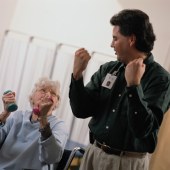- 8 Ways to Increase Dopamine Naturally
- 7 Best Breads for Maintaining Stable Blood Sugar
- Gelatin vs. Collagen: Which is Best for Skin, Nails, and Joints?
- The Long-Term Effects of Daily Turmeric Supplements on Liver Health
- Could Your Grocery Store Meat Be Causing Recurring UTIs?
- Are You Making This Expensive Thermostat Error This Winter?
- Recognizing the Signs of Hypothyroidism
- 10 Strategies to Overcome Insomnia
- Could Artificial Sweeteners Be Aging the Brain Faster?
- Techniques for Soothing Your Nervous System
Training Videos Seem to Boost Brain Activity: Study


People learning a new skill might pick it up more quickly by watching videos of other people performing the same task, a small new study suggests.
People who viewed training videos experienced 11 times greater improvement in their motor skills than people not provided the videos, the Italian research team reported.
Further, MRI scans revealed that the training videos appeared to boost the brain structure of the people who watched them, increasing the size of portions of the brain related to motor control and visual processing.
These findings suggest that such videos could help in the rehabilitation of stroke victims or people who suffer from motor neuron diseases such as multiple sclerosis, said co-author Dr. Paolo Preziosa, a neurologist at San Raffaele Hospital in Milan, Italy.
“Evidence suggests that this approach is an effective therapeutic intervention for regaining motor function,” Preziosa said. It might become a good strategy to use along with conventional physical and occupational therapy to help people with motor deficits, he said.
The study is scheduled for presentation at the annual American Academy of Neurology meeting in Philadelphia in April.
In the study, 36 healthy adults took part in 10 training sessions over two weeks.
All were asked to perform simple tasks with their dominant right hand, after receiving a full explanation of what each task entailed. These tasks included using cutlery, writing with a pen, using scissors, hammering a nail, typing and playing notes on a piano.
But half the group watched videos beforehand of other people performing the same tasks, Preziosa said. The other half watched videos of landscapes.
After two weeks, the group given training videos experienced a tremendous improvement in their motor skills, mainly in terms of strength.
Specific regions of their brains also appeared to change, as they experienced increases in the volume of the cuneus and insula. The cuneus plays a role in visual processing, while the insula is related to motor control and cognitive functioning.
One expert said he was surprised by the extent of the findings.
“It just shows how plastic the brain is, that even observing activity can remodel the brain,” said Dr. Glen Finney, an assistant professor of neurology at the University of Florida College of Medicine. “That suggests we have a lot more ability to change the brain even with low-level rehabilitation therapies than people appreciate. I was surprised they got that much change over a short period of time.”
Improvements in motor function might also have occurred because of activation of the brain’s “mirror neuron system,” Preziosa said.
“Several … studies demonstrated that [mirror neuron system] neurons discharge not only when an individual performs a specific goal-directed action, but also when an individual observes actions made by other individuals, implying an involvement of this system in imitation and motor learning,” he said.
In other words, these mirror neurons might help people learn new skills through observation and imitation.
Although the Italian researchers were specifically interested in the use of these videos in brain rehabilitation, Finney said their findings could apply to anyone preparing to try something new.
“It does suggest that this may be a good way to start,” he said. “Especially for people who aren’t ready to do the actual activity, it may be the best way to prepare.”
But, he added, observation has its limits when it comes to training.
“We certainly know this kind of training is not enough in and of itself to learn new abilities,” Finney said. “Otherwise we’d all be skiing like Olympians.”
Data and conclusions presented at meetings typically are considered preliminary until published in a peer-reviewed medical journal.
More information
For more information on the mirror neuron system, visit the American Psychological Association.
Source: HealthDay
Copyright © 2026 HealthDay. All rights reserved.










